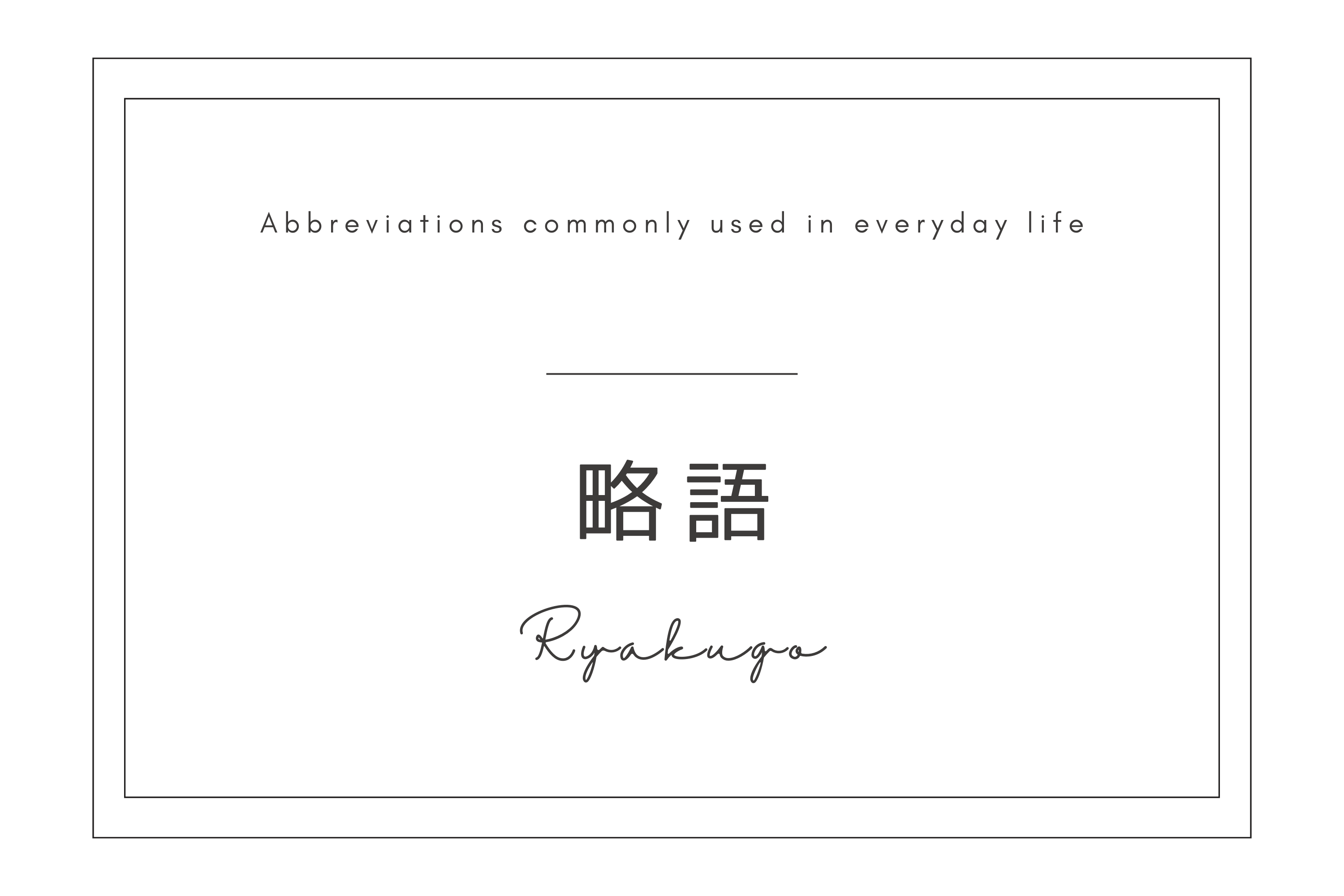
Introduction
"パソコン (pasokon)," "サブスク (sabu-suku)," and "終電 (shūden)." Do you know what the official names for these words are? Do you know what they mean? They are abbreviations for "パーソナルコンピューター (personal computer)," "サブスクリプション (subscription)," and "最終電車 (saishū-densha; last train)." All of these are more commonly used in their abbreviated forms rather than their official names. Perhaps the Japanese can be a bit lazy when it comes to words, so there are many such abbreviations in the Japanese language. By remembering these terms, I am sure that you will find it easier to communicate with native speakers!
〇活 (katsu)
"活
" is short for "活動
(katsudō; activity)." For example, "就活
(shūkatsu)" means job-hunting activities. Employment practices in Japan are dominated by the "新卒一括採用
(shinsotsu ikkatsu saiyō)" system in which new to-be university graduates are screened for employment while still in university at a fixed time each year, and are hired immediately after graduation. Because most students search for jobs and have interviews around the same time, competition is fierce, and advance preparation such as self-analysis and company research is crucial. Since university students start their job-hunting activities all at once, and it becomes a kind of an event, "就活
" has become a commonly used term among university students. Derived from this, various "〇活
" terms were created.
"婚活
(konkatsu)" means to actively seek more opportunities to meet people and improve oneself in order to find a partner to marry. There are places called "婚活
パーティー (konkatsu pātī)" where people who want to get married can get together and meet, and more recently, many people are use dating apps to engage in konkatsu.
【Example】大学3年生
は就活
と勉強
で忙
しい。(Daigaku sannensei-wa shūkatsu-to benkyō-de isogashii.)
【Meaning】Third-year college students are busy with job hunting and studying.
〇大 (dai)
The "大
(dai)" in this context stands for "university." A "私立大学
(shiritsu daigaku; private university)" is abbreviated as "私大
(shi-dai)," and a "短期大学
(tanki daigaku; junior college)" is abbreviated as "短大
(tan-dai)," and so on. Other terms include "美術大学
(bijutsu daigaku; art college)" as "美大
(bi-dai)," "芸術大学
(geijutsu daigaku; art and music college)" as "芸大
(gei-dai)," "音楽大学
(ongaku daigaku; music college)" as "音大
(on-dai)," and "医科大学
(ika daigaku; medical university)" as "医大
(i-dai)." Names of famous universities are also often abbreviated. "東京大学
(The University of Tokyo)" is often called "東大
(tō-dai)," while "京都大学
(Kyōto University)" is called "京大
(kyō-dai)," and so on.
【Example】田中
さんの娘
さんは音大
に通
ってるらしいよ。(Tanaka san-no musume san-wa ondai-ni kayotteiru-rashiiyo.)
【Meaning】I heard that Tanaka-san's daughter is attending music college.
〇ハラ (hara)
"ハラ (hara)" is an abbreviation for "harassment." It means to harass someone, and "セクシャルハラスメント (sexual harassment)" or "セクハラ (seku-hara; abbreviation of sexual harassment)" is a typical example of such harassment. Other types are "パワーハラスメント (power harassment)," which is harassment that takes advantage of a person's position or relationship in an organization, especially in the workplace. This is often called "パワハラ (pawa-hara)" in Japanese. Recently, people have become increasingly aware of the issues surrounding harassment, and measures have been taken in schools and workplaces to combat it. At the same time, there have been various terms created to address different types of harassment (in the form of "〇ハラ").
"アカデミックハラスメント (Academic harassment)," which is also called "アカハラ (aka-hara)," refers to the misuse of one's superior position or power in an educational or research institution to the detriment of others. Examples include a university professor changing a student's credit decision based on personal feelings. In addition to schools and workplaces, "モラルハラスメント (moral harassment)," or "モラハラ (mora-hara)" in the household has also become an issue. "モラハラ" refers to the mental harassment of a person by harassing them based on personal moral or ethical standards, and is also known as psychological domestic violence. Be careful not to become a harasser of "〇ハラ" as you may be harming others without even realizing it.
【Example】A課長
はセクハラが問題
になって、辞
めさせられた。(A kachō-wa sekuhara-ga mondai-ni natte, yamesaserareta.)
【Meaning】Section manager "A" was fired after their sexual harassment came to light.
〇割 (wari)
"割
(wari)" stands for discount in this context. You may receive a discount on tickets to movie theaters, museums, etc. by showing your student ID card. There are also services that offer discounts on smartphone fees and train fares if you are a student. This type of discount is called "学生割引
(gakusei waribiki; student discount)" or "学割
(gaku-wari)" for short. There are other types of discounts such as "社員
割引
(sha-in waribiki; employee discount)" which can be abbreviated as "社
割
(sha-wari)," that allows employees to purchase products of the company they work for at a discounted price. In addition, discounts that can be received by making early reservations for hotels or bullet train tickets are called "早
割
(haya-wari; early-bird discounts)." If you find the term "〇割
(wari)", don't forget to check to see if you are eligible for this service, as you may receive a discount!
【Example】入場
チケットは学割
で30%
安
くなります。(nyūjō chiketto-wa gakuwari-de sanjyuppāsento yasuku-narimasu.)
【Meaning】Admission tickets are 30% cheaper with a student discount.
〇休 (kyu)
"休
" means vacation, hiatus, etc. Paid vacations are officially called "有給休暇
(yūkyū kyūka)" but are often abbreviated to "有休
(yū-kyū)." Other terms include "産後
休暇
(sango kyūka; postpartum leave)" abbreviated as "産休
(san-kyū)" and "育児休暇
(ikuji kyūka; parental/childcare leave)" abbreviated as "育休
(iku-kyū)." Although not a vacation, when trains or buses are suspend, or in other words "運転
休止
(unten kyūshi)" due to bad weather or other reasons, it is called a "運休
(un-kyū)."
【Example】来週
末
は有休
を使
って北海道
に行
く。(Raishūmatsu-wa yūkyū-wo tsukatte hokkaidō-ni iku.)
【Meaning】I will be going to Hokkaido next weekend on paid vacation.
Summary
The abbreviations I just introduced are just a few, but all of them are words that you commonly hear in everyday life. You will probably see many of them on social media and in text messages as well, so I encourage you to learn them!
